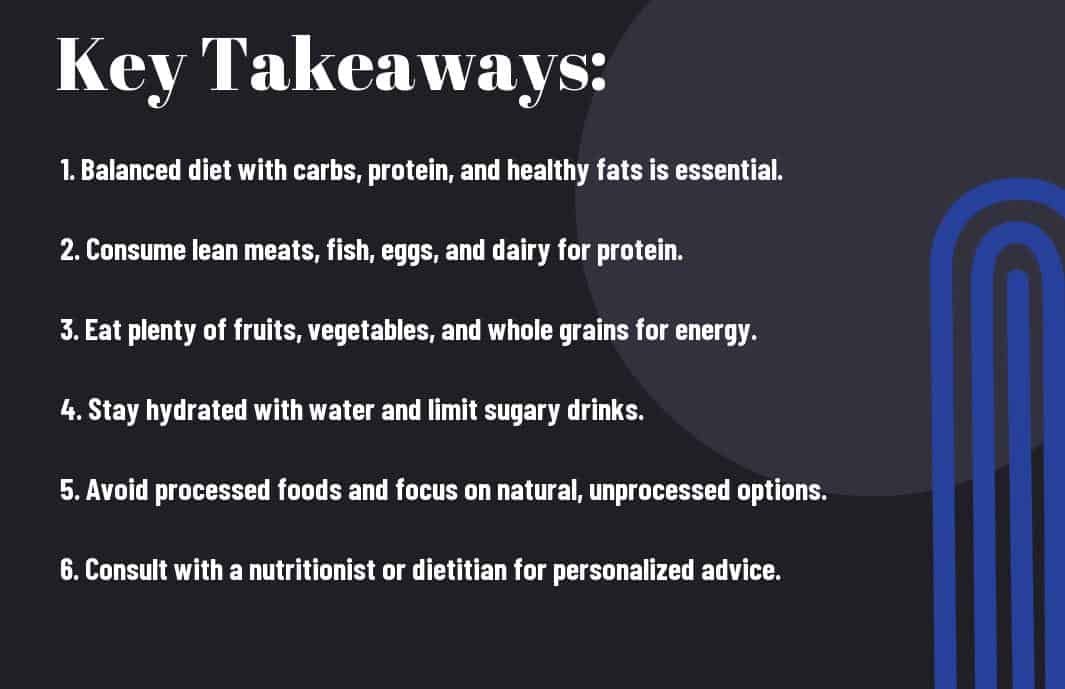Congratulations on starting your journey in martial arts! As you embark on this physically demanding and mentally challenging path, proper nutrition becomes even more crucial to your success. A beginner in martial arts should focus on a diet that provides the necessary energy, strength, and endurance required for training, while also promoting muscle recovery and overall well-being. In this blog post, we will explore the essential components of a diet suitable for a beginner in martial arts, including macronutrient ratios, hydration, and recovery foods.
Key Takeaways:
- Balance is key: A beginner in martial arts should focus on a balanced diet that includes a mix of carbohydrates, protein, healthy fats, and plenty of fruits and vegetables to fuel their training and aid in recovery.
- Hydration is crucial: Drinking plenty of water is essential for maintaining peak performance during martial arts training, as well as for overall health and well-being.
- Avoid excess processed foods: Limiting intake of processed foods, sugary snacks, and unhealthy fats is important for maintaining a healthy weight and supporting optimal physical performance.
- Listen to your body: Pay attention to how different foods affect your energy levels, mood, and recovery after training, and make adjustments to your diet as needed to support your martial arts practice.
- Consider working with a nutritionist: For personalized advice and guidance, beginners in martial arts may benefit from consulting with a nutritionist to develop a tailored meal plan that supports their training goals.

Understanding Nutrition Fundamentals
When starting your martial arts journey, it’s crucial to understand the fundamentals of nutrition. A balanced diet can significantly impact your performance, recovery, and overall health. In this chapter, you will delve into the essential aspects of nutrition that every beginner in martial arts should be aware of.
Macronutrients and Their Roles
Macronutrients, namely carbohydrates, protein, and fats, play vital roles in providing energy, supporting muscle growth and repair, and maintaining overall bodily functions. Carbohydrates are your body’s main source of energy, particularly for high-intensity activities such as martial arts. Protein is crucial for muscle repair and growth, as well as supporting the immune system, while fats are essential for hormone production and nutrient absorption. Ensuring the right balance of these macronutrients in your diet is essential for optimal performance and recovery.
Micronutrients and Hydration
In addition to macronutrients, micronutrients such as vitamins and minerals play a crucial role in maintaining overall health and supporting various bodily functions. It’s important to consume a wide variety of fruits, vegetables, and whole foods to ensure you get an adequate intake of these micronutrients. Furthermore, proper hydration is paramount for optimal performance and recovery, especially during intense martial arts training sessions. Dehydration can severely impact your physical and mental performance, so make sure you drink an adequate amount of water throughout the day.
When it comes to nutrition, it’s vital to understand the roles of macronutrients and micronutrients in your diet. Ensuring a balance of these nutrients will not only support your performance and recovery in martial arts but also contribute to your overall health and well-being. Additionally, staying adequately hydrated is key to optimising your physical and mental capabilities during training and competition.
Diet Plans for Martial Arts Beginners
When you are just starting out in martial arts, it’s important to ensure that your diet supports your training and helps you build the strength and stamina you need. There are a few key principles to keep in mind when planning your diet as a beginner in martial arts.
Sample Meal Plans and Timing
For a beginner in martial arts, it’s important to focus on eating a balanced diet that includes plenty of lean proteins, complex carbohydrates, and healthy fats. Start your day with a breakfast that includes whole grains, such as oats or whole grain toast, along with some protein like eggs or Greek yogurt. For your mid-morning and afternoon snacks, opt for options like nuts, seeds, or a piece of fruit to keep your energy levels up. For your main meals, aim for a balance of lean protein, vegetables, and whole grains. As for timing, aim to eat a meal or snack every 3-4 hours to keep your energy levels stable throughout the day.
Adapting Your Diet to Training Intensity
As you progress in your martial arts training, the intensity of your workouts may increase. This means you will need to pay closer attention to your diet to ensure you are properly fueling your body for the increased demands. You may need to increase your overall calorie intake to support the energy requirements of your training, and you may also need to adjust your macronutrient intake to provide enough fuel for your workouts. It’s important to listen to your body and make adjustments to your diet as needed to support your training intensity.
Supplements and Performance Enhancers
When you start martial arts training, you may consider using supplements or performance enhancers to improve your physical performance. However, it’s important to be well-informed about the potential benefits and risks associated with these products before incorporating them into your diet and training regimen.
When to Consider Supplements
As a beginner in martial arts, you may consider taking supplements if you have specific nutritional deficiencies that cannot be addressed through a balanced diet alone. This may include vitamin D, iron, or Omega-3 fatty acids. Additionally, if you are engaged in intense physical training, certain supplements may help to support energy production, muscle recovery, and overall performance. However, it’s crucial to consult with a healthcare professional or a registered dietitian before introducing any supplements into your routine to ensure that they are safe and appropriate for your individual needs.
Natural Alternatives for Increased Energy and Recovery
If you are looking to boost your energy levels and enhance recovery without relying on supplements, there are natural alternatives that can support your martial arts training. Consuming a well-balanced diet that includes a variety of whole foods such as lean proteins, complex carbohydrates, healthy fats, and plenty of fruits and vegetables can provide you with the essential nutrients needed for energy production and muscle repair. Additionally, staying adequately hydrated and getting enough rest are crucial for maximising your performance and recovery. Remember, the key to success in martial arts lies in consistency, discipline, and dedication to your training regimen.
Common Dietary Mistakes to Avoid
When you are starting out in martial arts, it is important to pay attention to your diet to ensure that you are fuelling your body properly for the physical demands of training. There are several common dietary mistakes that beginners often make, which can hinder your progress in martial arts.
Overlooking the Impact of Diet on Training
One of the biggest mistakes you can make as a beginner in martial arts is to overlook the impact of your diet on your training. What you eat directly affects your energy levels, endurance, and overall performance during your training sessions. Not consuming enough fuel before a workout can leave you feeling weak and fatigued, while eating the wrong types of foods can lead to digestive discomfort and sluggishness. It’s crucial to understand the connection between your diet and your training, and make the necessary adjustments to ensure that you are optimally fuelled for your martial arts practice.
The Dangers of Extreme Diets and Weight Cutting
Many beginners in martial arts fall into the trap of resorting to extreme diets and weight cutting in an attempt to achieve a certain physique or weight class. However, this approach can be extremely dangerous and detrimental to your health. Extreme dieting and rapid weight loss can lead to nutrient deficiencies, decreased muscle mass, and can compromise your immune system, leaving you more susceptible to injuries and illnesses. Additionally, it can have negative effects on your mental and emotional well-being, and can lead to disordered eating patterns. It’s important to remember that being lean and fit in martial arts should be achieved through a balanced and sustainable approach to nutrition and training, rather than through extreme and potentially harmful methods.
Conclusion
Presently, as a beginner in martial arts, it is important for you to focus on a well-balanced diet that includes a good mix of carbohydrates, protein, and healthy fats. It is crucial for you to fuel your body properly in order to support the physical demands of your training. Additionally, staying hydrated and consuming plenty of fruits and vegetables will help to keep your body strong and energized. As you progress in your martial arts journey, you may need to make adjustments to your diet to support your specific training goals and performance needs. Consulting with a nutritionist or sports dietitian can be beneficial in creating a diet plan that is tailored to your individual needs. Remember, nutrition plays a key role in your overall success in martial arts, so make sure to take it seriously and fuel your body for optimal performance.
FAQ
Q: What diet should a beginner in martial arts follow?
A: As a beginner in martial arts, it’s important to focus on a well-rounded diet that includes lean proteins, complex carbohydrates, healthy fats, and plenty of fruits and vegetables. It’s essential to fuel your body with nutrients that will support your training and recovery.
Q: What are some examples of lean proteins?
A: Lean proteins include chicken, turkey, fish, tofu, and beans. These proteins are essential for muscle repair and growth, which is important for martial artists who are engaging in physical activity regularly.
Q: What are good sources of complex carbohydrates?
A: Complex carbohydrates can be found in foods such as brown rice, quinoa, whole grain pasta, and oats. These carbohydrates provide sustained energy for your workouts and can help keep you feeling full and satisfied.
Q: Why are healthy fats important for martial artists?
A: Healthy fats, such as those found in avocados, nuts, seeds, and olive oil, are important for overall health and can help reduce inflammation in the body. They also aid in the absorption of fat-soluble vitamins, which are essential for overall wellness.
Q: Should beginners in martial arts be concerned about hydration?
A: Yes, staying hydrated is crucial for martial artists, as they are engaging in physical activity that leads to sweating and fluid loss. Aim to drink plenty of water throughout the day and especially before, during, and after training sessions.
Q: Are there any foods that beginners in martial arts should avoid?
A: It’s best to limit the consumption of processed foods, sugary drinks, and foods high in saturated fats. These types of foods can lead to inflammation, decreased energy levels, and can hinder overall performance.
Q: How important is it to eat before and after training sessions?
A: Eating before and after training sessions is crucial for providing your body with the energy it needs to perform at its best and to aid in recovery. Aim to eat a balanced meal or snack that includes carbohydrates and protein within an hour of completing your workout.



